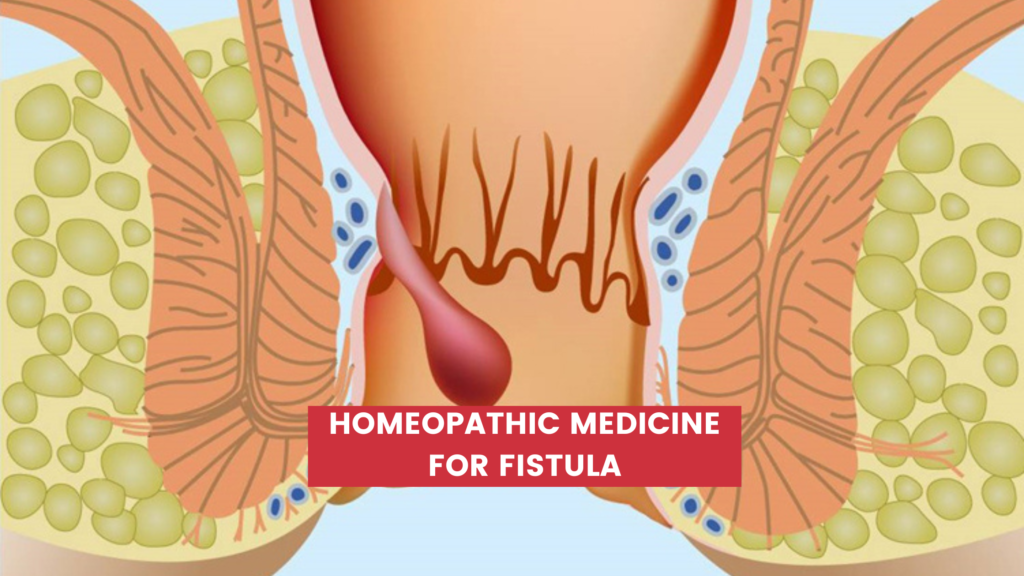A fistula is an abnormal connection or passage between two organs or tissues, often developing as a result of an infection, injury, or surgery. Anal fistula, the most common type, occurs when a small tunnel forms between the skin near the anus and the rectum. Fistulas can cause pain, discomfort, and recurrent infections, significantly impacting a person’s quality of life. While surgical treatments are commonly used to manage fistulas, homeopathy offers a natural, non-invasive approach to healing fistulas by addressing the root cause and promoting the body’s natural ability to repair itself. In this blog, we’ll explore the causes, symptoms, and the 10 most effective homeopathic remedies for treating fistulas.
Causes of Fistula
Fistulas typically develop when an infection leads to an abscess that fails to heal properly. The most common causes of fistulas include:
- Chronic Abscesses: When an infection causes an abscess in the tissue, it may not fully heal, leading to the formation of a fistula.
- Inflammatory Bowel Disease (IBD): Conditions such as Crohn’s disease and ulcerative colitis can cause chronic inflammation in the intestines, increasing the risk of fistulas.
- Injury or Trauma: Physical injuries or trauma to the tissue can cause the formation of a fistula.
- Surgery or Radiation Therapy: Fistulas can occur as a complication of surgery, radiation therapy, or other medical treatments that damage tissues.
- Infections: Recurrent infections, particularly in the anal or rectal area, can contribute to fistula formation.
- Diverticulitis: A digestive condition where small, bulging pouches (diverticula) form in the digestive tract, which can become infected and lead to a fistula.
- Tuberculosis: In some cases, tuberculosis infections can cause fistulas to develop, particularly in the intestines.
Symptoms of Fistula
The symptoms of a fistula can vary based on its location and severity, but the most common symptoms include:
- Pain or Discomfort: Fistulas often cause pain, especially during bowel movements or when sitting.
- Recurrent Abscesses: Persistent abscesses or swelling in the affected area can indicate the presence of a fistula.
- Foul-Smelling Discharge: Fistulas may produce pus or fluid that drains from the opening, often accompanied by a foul smell.
- Swelling or Redness: Inflammation, swelling, and redness are common symptoms around the fistula opening.
- Skin Irritation: The drainage from a fistula can irritate the skin, leading to itching, redness, or rashes.
- Fever: In cases of infection, fever and chills may accompany other symptoms.
- Bleeding: Some individuals may notice blood in their stool or on toilet paper after a bowel movement.
Homeopathic Medicine for Fistula
Homeopathy offers an effective, gentle approach to treating fistulas by stimulating the body’s natural healing process and addressing both the underlying cause and symptoms. Here are the 10 most effective homeopathic medicines for fistulas:
1. Silicea
Silicea is one of the most commonly used homeopathic remedies for fistulas, particularly when there is recurrent abscess formation and discharge of pus. It helps in draining the pus and promotes healing of the fistula, especially when the patient is weak and has a low resistance to infections.
When to use:
- Recurrent abscesses with pus discharge
- Weakness and low immunity
- Slow-healing fistulas
2. Hepar Sulphuris
Hepar Sulphuris is highly effective for treating fistulas that are painful and associated with abscesses that tend to form pus. It is particularly helpful when the fistula is sensitive to touch, and the discharge has a foul odor.
When to use:
- Painful fistulas with foul-smelling discharge
- Sensitive to touch or pressure
- Accompanied by abscesses that form pus
3. Calcarea Sulphurica
Calcarea Sulphurica is recommended for fistulas with a yellowish discharge that may be thick or lumpy. It is beneficial for individuals who experience delayed healing and persistent infections around the fistula.
When to use:
- Yellow, thick discharge from the fistula
- Delayed or incomplete healing
- Recurrent infections
4. Myristica Sebifera
Myristica is known as a “homeopathic knife” for its ability to help drain pus and avoid surgery in cases of fistulas and abscesses. It is particularly effective for hastening the formation of pus and promoting drainage, helping to relieve pain and infection.
When to use:
- Fistulas with abscesses that require drainage
- Helps avoid surgical intervention
- Relieves pain from pus formation
5. Silphium Laciniatum
Silphium is particularly useful for treating fistulas in individuals with chronic bowel conditions, such as Crohn’s disease. It helps reduce inflammation and promote healing of fistulas related to bowel dysfunction.
When to use:
- Fistulas associated with bowel disease
- Chronic inflammation in the digestive tract
- Accompanied by digestive disturbances
6. Mercurius Solubilis
Mercurius Solubilis is highly effective for fistulas with bloody discharge or where there is an offensive, purulent secretion. This remedy works well when there is an accompanying fever or night sweats, indicating an active infection.
When to use:
- Fistulas with bloody or purulent discharge
- Accompanied by fever or night sweats
- Offensive odor from the discharge
7. Phosphorus
Phosphorus is beneficial for individuals with fistulas who experience bleeding, particularly bright red blood, from the fistula. It helps in stopping the bleeding and promoting healing in cases of fistulas accompanied by chronic inflammation.
When to use:
- Fistulas with bright red bleeding
- Accompanied by chronic inflammation
- Weakness and fatigue after blood loss
8. Lachesis
Lachesis is recommended for fistulas that are highly inflamed and swollen, particularly when the fistula is sensitive to touch. It works well for individuals who experience pain and discomfort that worsens at night.
When to use:
- Fistulas with intense inflammation and swelling
- Sensitivity to touch or pressure
- Symptoms worse at night
9. Fluoricum Acidum
Fluoricum Acidum is effective for fistulas that are long-standing and difficult to heal. It helps when the fistula has a history of recurring abscesses, and the surrounding tissue has become hard or thickened.
When to use:
- Chronic, recurring fistulas
- Hard, thickened tissue around the fistula
- Accompanied by recurrent abscess formation
10. Sulphur
Sulphur is a powerful remedy for fistulas with persistent itching, burning, and discharge. It is particularly helpful for individuals who experience irritation and inflammation around the fistula, especially when the discharge causes skin irritation.
When to use:
- Fistulas with itching, burning, and discharge
- Skin irritation and inflammation
- Symptoms worsened by heat
Conclusion
Fistulas can be a painful and recurrent condition, but homeopathy offers a gentle and natural approach to treating the underlying cause and promoting healing. Remedies like Silicea, Hepar Sulphuris, and Myristica Sebifera are particularly effective in managing fistulas, reducing pain, and preventing further complications. As always, it is essential to consult a qualified homeopathic practitioner to determine the best remedy for your individual case. With the right treatment plan, homeopathy can provide lasting relief and improve quality of life for individuals suffering from fistulas.


